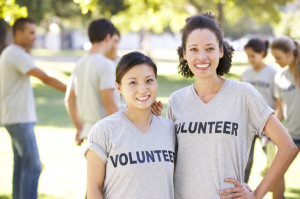The many benefits of volunteering
Do you volunteer your time to help community organizations? In Utah, more than half of all residents donate their time to help their communities, according to the Corporation for National and Community Service, which ranks Utah No. 1 in the country for its volunteering efforts.
Volunteers provide essential services and benefits throughout the state. That includes everything from delivering meals to those who are homebound to serving as volunteer firefighters and in disaster relief efforts, to cleaning up waterways, green spaces and neighborhoods. Professionals donate their time as well; doctors and nurses volunteer in free clinics and disaster areas and financial professionals lead financial literacy workshops, for example. Volunteers are also essential in the arts, taking tickets at performances, museums and other venues.
The volunteers themselves benefit, too. Studies show that volunteering boosts the volunteer’s mood, self-esteem and even physical fitness. By keeping volunteers in regular contact with others and providing a sense of purpose, volunteering can help combat depression and feelings of isolation. One study found that people who volunteer every month are 7 percent more likely to describe themselves as “very happy,” while those who volunteer every two to four weeks are 12 percent more likely.
Joining a volunteer organization is an excellent way to meet friends and become a part of your community, and families can be strengthened by volunteering together. Helping others in the community teaches children important community values and shows them how good it can make them feel to make a difference in someone’s life.
Many volunteer activities, such as neighborhood or environmental clean-ups, require physical activity that helps volunteers stay physically fit. Why not get your exercise and help others at the same time? It’s a win-win situation!
Volunteering can also help you learn new skills and hone your ability to work as part of a team and to be a leader. One study found that volunteers have 27 percent higher odds of finding a job after being out of work than non-volunteers, possibly due to developing new skills and expanding personal networks.







